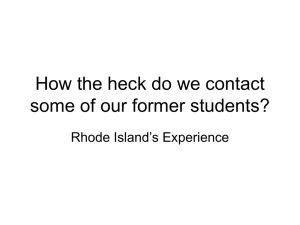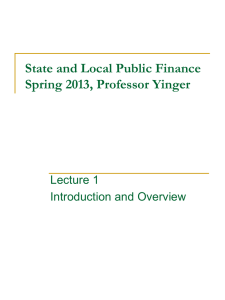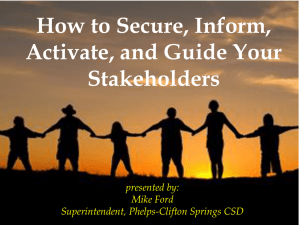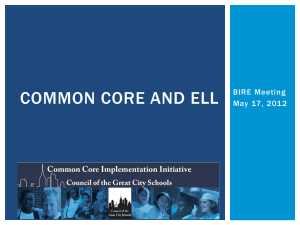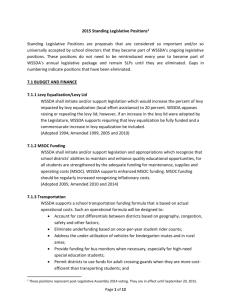Work Groups and Reports - Washington State School Directors
advertisement
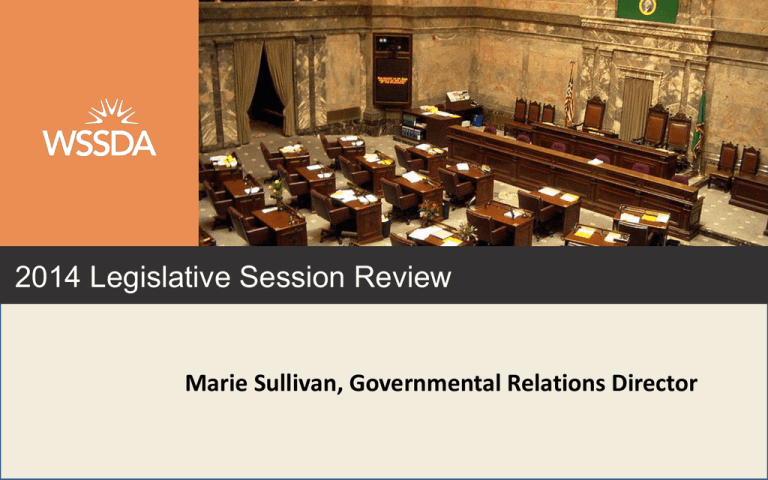
2014 Legislative Session Review Marie Sullivan, Governmental Relations Director Even Year, Short Session • 60-day session • Convened January 13 • Last day was March 13 (Yippee!) – Technical fixes, hero bills, holdovers from 2013 session • 1,343 bills introduced in 2014 • 3,000 bills “available” from 2013 • 229 passed – Supplemental budgets for operating, capital, transportation • McCleary decision 2 Senate Status • Senate is controlled by 24 Republicans and 2 Democrats • Six new senators – Five former House members – One new senator – All will be up for re-election this November • No changes to committee chairs – Andy Hill, R-Redmond (Budget) – Steve Litzow, R-Mercer Island (Education) – Barbara Bailey, R-Oak Harbor (Higher Ed) 3 House Status • • • • House controlled by Democrats, 55-43 Seven new members Everyone is up for re-election in 2014 No changes to House leadership or committee chairs – – – – – Rep. Sharon Tomiko Santos, D-Seattle (Education) Rep. Ross Hunter, D-Medina (Budget) Rep. Kathy Haigh, D-Shelton (Budget subcommittee) Rep. Ruth Kagi, D-Shoreline (Early Learning) Rep. Larry Seaquist, D-Gig Harbor (Higher Education) 4 Caucus Priorities - January • Majority Coalition Caucus: Jobs, education, sustainable budgets • Senate Democrats: Reproductive parity, state DREAM Act, transportation, education phase in • House Democrats: Progress on funding basic education, help the most vulnerable (particularly mental illness), implementation of what has been passed (e.g., health benefit exchange, Medicaid expansion) • House Republicans: Jobs, any surplus funds support McCleary, pension liability, money in reserves 5 2014 Supplemental Budget • Traditionally technical fixes, adjustments to assumptions, revenue stabilization – Caseloads have increased for K-12 schools – 10,200 more kids – November revenue forecast up by $16M for 2013-15 • Budget leaders had “Just say no” approach for much of session • Inslee first proposal added $6.4M in policy investments – $3M for teacher mentor programs – $495,000 for STEM curriculum – $300,000 to develop course equivalency framework for math and science, course modules 6 Dorn Pre-session Request • $385M to carry forward basic education funding in FY15 – Increase full-day kindergarten to 50% of total kindergarten population – Reduce high poverty class sizes in grades 2 and 3 to 20.3 student FTE – Fund Materials, Supplies, and Operating Costs (MSOC) at $1,090.45 per student – Reinstate the BEA MSOC multiplier as the means for calculating CTE and Skill Center MSOC ($51.8M) and correct CTE and Skill Center staffing ($20.8M) – Fund two Learning Improvement Days ($45.1M) 7 WA Supreme Court Order • Issued January 9, 2014; 8-1 decision • Order responded to Legislature report on funding progress in 2013 session to meet constitutional education requirements • Acknowledged that “meaningful steps were taken” • Expressed concern that the State was “not on target to implement ESHB 2261 and SHB 2776 by the 2017-18 school year.” – Credited Legislature with $982 million in 2013-15 budget but says the level falls well short of the estimated funding needed – Directs the State to provide a complete phase-in plan for meeting its goals by April 30, 2014 8 WSSDA Priorities • Fund and implement all aspects of Washington’s redefined program of Basic Education. • Fund two days of state- and district-directed professional development through an appropriation in the supplemental budget. (HB 2313/SB 6161) • Restore state basic ed funding to districts that receive federal timber payments for lost taxable property. (HB 2207/SB 5986) • Impose no new mandates for the 2014-15 school year. 9 Dominant Education Issues • • • • • • Dreams and Hopes (SB 6523) ESEA Waiver (HB 2800/SB 5880) School facility capacity for science, K-3 and all-day K Teacher COLAs – 6 years – 000000 New revenue through closing tax loopholes 24 credit diploma, hours, and course equivalencies (E2SSB 6552) 10 Supplemental Op Budget • February revenue forecast – Inslee $200M in K-12 – COLAs – Close 7 tax loopholes to fund investments • Senate budget came out first – $38M for MSOC – $0 for restoration to timber districts • House budget came out a few days later – $60 million for MSOC – $2 million for restoration to timber districts (HB 2207) 11 So, How’d They Do - Budget • $58 million in new investments for MSOC • $97 million shift from 1,080 hours to begin phase in of 24-credit diploma (more later) • $2 million for federal forest • $2 million net for miscellaneous – $558,000 for transportation adjustment – $245,000 for closing opportunity gap – $2 million to expand Beginning Teacher program grants to districts for new teachers 12 So, How’d They Do – 1,080 Hours and 24-Credit Diploma • Makes changes to prototypical school funding model to shift the $97 million in current budget (FY15) – Eliminates the requirement to spend the funding to implement 1,080 hours for grades 7-12 (averaged by grade) for 2014-15 – Additional $164 per student in grades 9-12 – Reduces lab science classroom ratios – Increases high school guidance counselors from 2.009 to 2.539 per school – 1,080 hours for grades 9-12 in the 2015-16 school year, district average 13 So, How’d They Do - Budget • No supplemental capital budget • School capacity construction grants – Lots of ideas – No action 14 So, How’d They Do - General • Good news: – Authorized 24-credit diploma for class of 2019, but 2020 and 2021 are okay too, some change to structure – Funded early learning improvements but no bill – Left $315M in the ending fund balance – Avoided unfunded mandates • Bad news: – No formal written plan to phase in basic education and meet McCleary, per January 9th order from Court – Still short on funding trajectory for 2261/2776 – Didn’t adopt QEC 2014 recommendations in full – Didn’t fund professional development 15 Students • SSB 6074 – Homeless student educational outcomes – Three parts: Identification, training, and communication – Only mandate is to include information in existing materials • 2SSB 6163 – Expanded learning opportunities (ELO) – Creates a Council to provide recommendations on annual basis to improve a system of Expanded Learning Opportunities • WSSDA, WASA, AWSP, WSPTA, WEA all have reps – Defines ELOs as: • Culturally responsive enrichment and learning activities; • School-based programs that provide extended learning and enrichment beyond the traditional school day, week or calendar; and • Structured, intentional and creative learning environments outside the traditional school day provided by community-based partners 16 Students • SSB 6431 – Youth suicide prevention – Supporting youth suicide prevention programs – Grant program for communities of high risk • SB 6523 – The REAL HOPE Act – Introduced in 2013 – Senate included $5 million – First bill signed by the governor 17 SB 6552 – 24 Credits, Hours, Equivalencies • Authorizes 24-credit diploma for class of 2019 – Allows a district to extend to 2020 or 2021 via waiver application – SBE can’t deny, must grant at the next meeting after application • Directs WSSDA to create model policy to allow two-credit waiver for students under exceptional circumstances – Don’t need to fail to succeed – Policy due June 30, 2015, Districts must adopt by 2015-16 • Starting with class of 2015, removes the culminating project requirement 18 SB 6552 – 24 Credits, Hours, Equivalencies • SBE rules must provide that the 3rd credit of math or science are chosen by a student based on HSBP • OSPI to develop a list of CTE courses that are equivalent to math and science academic courses • Starting in 2015-16, districts must offer students the opportunity to access at least one math or science CTE course from the OSPI list. – Districts with fewer than 2,000 students can seek a SBE waiver • Creates a three-year task force on students with special needs 19 School Operations • 2SHB 1709 – Interpreters in schools – OSPI and OEO to post info on web site re: phone interpretation vendors on contract with the State, and school districts are encouraged to use the phone interpretation system • SHB 2105 – Government meeting agendas – Regular meeting agendas must be posted online 24 hours prior – Exemption for no website or districts with fewer than 10 FTE – Subsequent modifications to the agenda are okay • HB 2276 – Residential schools and ESDs – Allows ESDs to enter into an agreement to provide a program of education for residential school residents or detention facilities on behalf of the school district as a cooperative service program. 20 School Operations • HB 2575 – Teacher assignment data – Starting with the 2014-15 school year, districts must include dates of teacher assignments and reassignments for each class or course offered in each school. • SB 5964 – Public records training – Requires elected or appointed school board directors to complete training in the public records act and open public meetings act within 90 days of taking office or assuming duties. – Must refresh every 4 years as long as in office. – Requires designated public records officers to take training no later than 90 days after assuming their responsibility. – Takes effect July 1, 2014. 21 School Operations • 2SSB 6062 – Posting school data on web sites – Collective bargaining agreements must be posted to the district web site by Sept. 1, 2014, and within 30 days after approval, renewal or completion of future agreements. – Each district with an ASB fund must publish certain information on the school web site (if separate school sites) by August 31, 2014, for the 2012-13 and 2013-14 school years. • Information must be updated by August 31 each year, must maintain information for five previous years. – Fund balance at beginning of the school year; – Summary data about expenditures and revenues during the year; – Fund balance at the end of the school year 22 School Operations • SB 6128 – Delivery of student medications – Creates a blanket option for a non-licensed employee who is asked to administer medications or perform nursing services to file a voluntary, written, current, and unexpired letter of intent stating the employee’s willingness to administer the new medication or nursing service. – Employee is not subject to reprisal for refusing to file a letter. – Districts must designate a health professional to consult and coordinate with the student’s parents and health care provider, and to train and supervise the appropriate school district personnel in proper procedures to deliver the medication or nursing service. 23 School Operations • ESSB 6242 – Economy & Efficiency waivers – Keeps limit to five school districts: 3 with student FTE 150-500; 2 with student FTE of less than 150. – Extends the pilot through August 31, 2017 • SB 6424 – Seal of biliteracy – Encourages districts to award a seal to graduating high school students who meet OSPI-developed criteria, including a notation on the diploma and on a high school transcript. – Students must demonstrate proficiency in English as well as the world language. – World language includes American Sign and Native American. 24 School Ops - Accountability • HB 2167 – Deadline for identifying challenged schools – Was December 1, 2014, annually thereafter – Moved to February 1 of every year – OSPI identifies challenged schools in need of improvement, and a subset of schools that are persistently lowest-achieving schools – OSPI to report to SBE identified schools for Required Action District (RAD) status, support and funding 25 School Ops – Didn’t Pass • Breakfast after the Bell • Identifying students from military families • Adding emotional harm to definition of Harassment, Intimidation and Bullying, requiring training • Notification policy for school injury 26 Staff • SSB 5173 – Unpaid holidays for faith, conscience or organized religious activity – All school employees entitled to 2 days of unpaid leave • School board must adopt resolution with guidelines for unpaid leave • Must be allowed unless employee absence would impose undue hardship on the employer OR the employee is necessary to maintain public safety. – Students are excused from school subject to parental approval • Up to 2 days per school year • Still counted as FTE students under basic ed statute • Workforce board to develop rules for students in state-funded workforce training programs to ensure students’ grades aren’t affected – OFM to develop rules to define “undue hardship” 27 Staff • SSB 6129 – Paraeducator development, work group – Design program-specific minimum employment standards – Professional development and education opportunities that support the standards – A paraeducator career ladder – Articulated pathway for teacher preparation and certification – Teacher professional development on the use of paraeducators • January 10, 2015 – report on ELL, TBIP, LAP, Title I; career ladder; articulated pathway; PD for teachers on use of paraeducators • January 10, 2016 – report on basic education and special education, PD – WSSDA not named but to be invited 28 Staff • SB 6321 – TRS3 contribution rate – After January of 2015, a member of the Teachers Retirement System Plan 3 may only change their contribution rate when: • They change employers • Within 90 days of changing employers – Removes option of changing each year based on feedback from the IRS 29 New Goals, Adopted Plans • HCR 4416 – Educational attainment – All adults, aged 25-44, will have a high school diploma or equivalent by 2023 – At least 70% of Washington adults, aged 25-44, will have a postsecondary credential by 2023 – The cost of tuition shall not be barrier to postsecondary education – By Dec. 1, 2014, WSAC report on achieving each goal • SCR 8409 – High skills, High Wages plan – Created by the Workforce Training and Education Coordinating Board – 10-year plan through 2022, must be adopted by Legislature 30 Work Groups and Reports • Expanded Learning Opportunity Council (SB 6163) – Report due December 1, 2014; WSSDA is a member • Barriers to 24-credit diploma for students with special needs (SB 6552) – Initial report due December 15, 2014; then December 2015, 2016; WSSDA is a member • College Bound Scholarship Feasibility (SB 6436) – Report due December 31, 2014; WSSDA to be invited member • Paraeducator standards review (SB 6129) – Reports due January 10, 2015 and January 10, 2016; WSSDA to be invited member 31 Work Groups and Reports • Volunteer interpreters at schools (2SHB 1709) – OEO to submit feasibility study for development of a state foreign language education interpreter training program to create a pool of trained interpreters for public schools, including volunteers – Due February 1, 2015 to education committees • Healthiest Generation Council (ESSB 6002 – Section 219, (24)) – DOH, OSPI, DEL, others to expand programs across state to increase physical activity and access to healthy food and water – Revise statewide guidelines for schools for quality health and fitness education – Report by Dec. 31, 2014 and June 30, 2015 32 Work Groups and Reports • Student success in school (SHB 2739) – Education Data Center contract with EWU to: • Conduct geographic analysis to identify areas where the cumulative effect of family factors (e.g., employment, health, safety, stability) correlate with academic and behavioral indicators of student success • Report due – with maps – by January 31, 2015 • Weighted GPA (Rep. Ortiz-Self interest) – Bill didn’t pass, but interest remains to create a weighted GPA system to reduce barriers to student selection of IB and AP • Seal of biliteracy (SB 6424) – Due December 1, 2017 on number of students awarded the seal and languages spoken compared to participation in TBIP 33 Work Groups and Reports • Educational attainment – Washington Student Achievement Council (HCR 4416) – Encouraged to develop and adopt strategies that will enable the state to achieve each of the goals – Recommendations for the strategies that require legislation or specific appropriations – Timelines and benchmarks towards achieving each goal – Incorporate the information into the WSAC 10-year strategic plan 34 Work Groups and Reports • Outcomes for students who are homeless – OSPI (SSB 6074) – By January 10, 2015, and every two years thereafter: • Number of identified homeless students enrolled in public schools; • Number of homeless students participating in LAP, HiCap and Running Start; • Academic performance, including test scores, dropout rates, absenteeism and truancy, suspension and expulsion data. • TBIP accountability task force – OSPI (6002, Sec.501(1)(y) – Convene a task force to design a performance-based assistance and accountability system for the Transitional Bilingual Instruction Program. – Report and recommendations due January 15, 2016. 35 New School Policies • 2SHB 1709 – School interpreters – Language access policy • E2SSB 6552 – Two-credit waiver from 24 credit diploma for students with unusual circumstances • Possibilities – – – – SHB 2105 – Posting regular meeting notices SSB 6078 – Recognizing Native American Heritage Day SB 6128 – Delivery of student medications SB 6424 – Seal of biliteracy 36 New Rules • SB 6424 – seal of biliteracy (OSPI) – Criteria to recognize a high level of proficiency in one or more world languages other than English. • E2SSB 6552 – graduation requirements (SBE) – Authorize local district policy for 2-credit waiver – 3rd credit of math and science can be CTE – Clearly articulate personalized pathway credit options • SB 5173 – definition of “undue hardship” (OFM) • Will want to submit comments from school districts re: cost of subs, small schools, other? 37 Mandates • Course equivalencies for math or science (SB 6552) – 2015-16 school year, school districts must grant at least one CTE course equivalency for math or science from a list prepared by OSPI. – Access through high schools, interdistrict cooperatives, skill centers or branch or satellite skill centers, or through online learning or applicable Running Start vocational courses. – Districts with fewer than 2,000 students may apply to the SBE for a waiver from the requirement. • Post CBAs and ASB funds to school website (SB 6062) • Teacher assignment data (HB 2575) 38 This and That • April 30 deadline for report to Supreme Court • 2014 elections – Sens. Klein, Eide and Holmquist Newbry not returning – Reps. Roberts and Hope not returning – Senate races will be in big-time play • Tom, Hill, Fain, O’Ban, Angel, Hobbs • Unless specified differently, all bills are effective 90 days after the end of session (June 10, 2014) 39 Interim Challenge • 2015-17 critical year for education investments – Talk with your legislators NOW about previous investments, what you need to be successful • Capacity issues – Invite legislators to visit your schools and classrooms – Capacity issues need to become “real” to them • To get professional development, they need to see it – Invite legislators to watch your PLCs or sessions where data is being analyzed – See TPEP in action 40 Questions and answers




